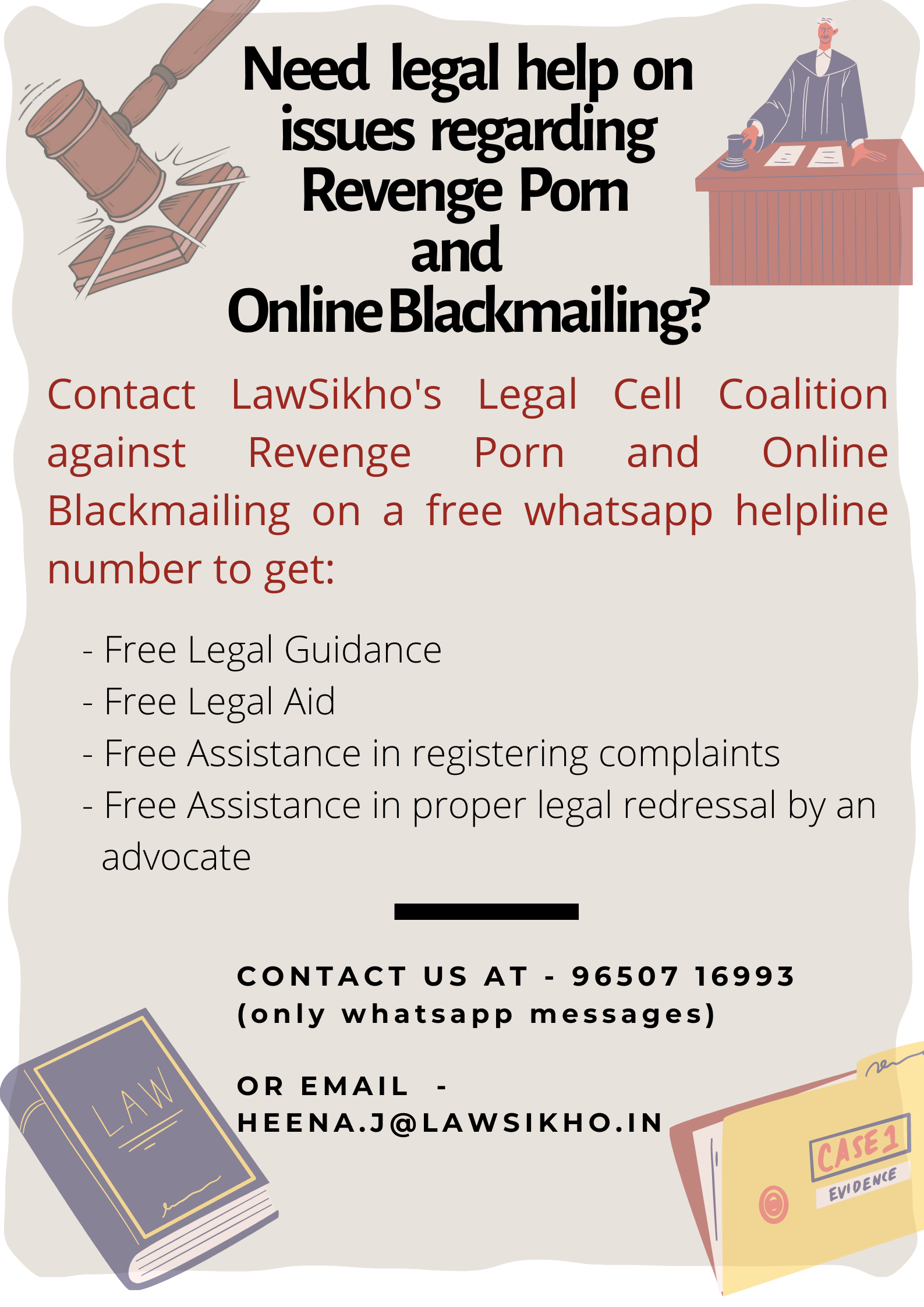This article is written by Durgesh Nandini, from D.E.S.Shri Navalmal Firodia Law College Pune. Here she has discussed online sexual assault, sexual harassment at the workplace and ways to come out of it.
Table of Contents
Introduction
If a person is sending you nudes and inappropriate pictures without your consent, what will be your stand over this? Are you going to ignore and delete that picture, or are you going to block that person? But what if this person is your boss, teacher or a person who affects your life and career directly or indirectly then are you going to block him or are you going to ignore his message and keep quiet? And is blocking and ignoring the solution to this issue? Is it wrong and illegal?
Recently the second wave of COVID-19 hit us badly and the same situation has been going on for the whole year. During the pandemic, people are unable to meet physically because of strict lockdown. So during this time, people are engaging more in sexting and people are using different dating apps and websites for sexting and other sexual activities. Many countries did surveys on sexual activities during the pandemic and they found an increase in sexting. This brings pleasure, but it also brings many crimes and cases of online sexual assault. During the lockdown, online engagement is increasing and this is why cases of online bullying, sexual harassment and online blackmailing are also increasing.
Is it against the law
Yes, this act of sending unwanted nudes and inappropriate pictures and texts is against law and you can take legal action against it.
There are no adequate laws that deal with sexual offences specifically in cyberspace. Some aspects of sexual offences in cyberspace are covered under the Indian Penal Code and Information Technology Act, 2000.
Sending a woman obscene material like pornographic videos, obscene pictures, films, messages and nudes against the will of that woman is an act of sexual harassment mentioned under section 354-A of the Indian penal code.
- Section 354-A of the Indian Penal Code talks about sexual assault. It says if –
A man touches a woman sexually and inappropriately that she does not like and feels bad about it
For example, if a man works in an office and while transferring files or explaining something to you (a woman), he touches you in a bad manner which you do not like.
A man is asking a woman for any sexual favour
For example, your boss calls you (a woman) and asks you to have sexual relations with him and then he will give you a promotion.
A man is sending a woman pornography like nudes and dirty pictures against her will
For example, your boss is sending you his or some other person’s naked or half-naked photos and you haven’t asked him for it.
A man is sending a woman sexual texts or audios or making sexual comments in the form of metaphors and using code words
For example, your boss saw you and he started passing sexual jokes or he is sending you sexual messages in the form of metaphors.
If a man is forcing a woman to do any of these above-mentioned things then he could be charged for sexual assault. And if he is committing any act mentioned under clause (i) or clause (ii) or clause (iii) of Subsection (1) then he shall get rigorous imprisonment which may extend up to 3 years, or with fine or with both fine and imprisonment.
Yes, transmitting obscene and pornographic material in electric form is a crime.
- Section 67 of IT Act, 2000 says that whoever distributes or transfers or causes to be transferred or distributed obscene photos or messages in the form of electronic medium shall be punished with imprisonment of up to 3 years and a fine of up to 5 lakh rupees. And if he repeats the same act then he will be punished with imprisonment of 5 years and a fine of up to 10 lakh rupees.
- Section 67A says that whoever publishes or sends or transfers any obscene material like photos, videos or texts in the electronic form shall be punished with imprisonment of up to 5 years and a fine of up to 5 lakh rupees. If he repeats this act for a second time, he shall be punished for up to 7 years and a fine of up to 10 lakh rupees.
- Section 67B says that whoever publishes or shares or distributes any digital text or image that depicts children obscenely or indecently or in a sexually explicit manner shall be punished with imprisonment of up to five years with a fine of up to 10 lakh rupees. And if the person is sending you obscene photos and pictures of children then he will be punished under the sections of the Protection of Children from Sexual Offence (POCSO) Act 2012 as well.
- Section 13 talks about the use of child pornography. Whoever uses a child or its organ obscenely and inappropriately in the form of print, electronic computer or any other technology and publishes or distributes it.
- Section 14 says that whoever uses a child or its organ for pornographic purposes as mentioned under Section 13 shall be punished with imprisonment which may not be less than 5 years and with a fine. And if he repeats the act then he shall be punished with the imprisonment of not less than 7 years with a fine.
- Section 15 says that whoever possesses or stores pornographic material related to a child and its organs in any form to share and transmit it and he fails to delete or destroy it or report it to the designated authority shall be liable to pay the fine not less than five thousand rupees. If he repeats the act he shall be liable to pay the fine not less than ten thousand rupees.
In 2018, NCRB (National Crime Record Bureau) conducted a study, according to its statics for adults, 6325 cases were filed under Section 67,67A and 67B of the IT Act in all states and union territories and for juveniles, 65 cases were filed under above-mentioned Sections. But in these statistics, it was not clear how many cases were related to consensual acts.
Why is the act of sending obscene pictures wrong
Absence of consent
For this kind of act, the consent of the other person is very important. Let’s take a situation where the sender is the teacher or colleague or boss and he or she is sending inappropriate pictures and videos without the consent of the receiver. It is against the will and law.
Let’s take another situation where two people are in a relationship. They used to have sexual relations. They are sexting, even though the sender must ask the receiver whether he or she is willing to get these photos. And if the receiver of such photos has not asked for it and still the sender continues to send such photos. Then it is wrong and against the law.
Against privacy
Here, the question is how it is against the right to privacy? Sending this kind of photos is an indication of the willingness of having sexual relations with the receiver. And with whom you want to share a sexual relationship is a matter of choice and privacy.
Privacy is not limited to physical space but is a state of mind. If someone is sending individual obscene photos and videos against his or her consent then this individual may face mental stress and anxiety. This is against his or her mental peace and mental space so he or she is not able to enjoy the mental peace which is against the right to privacy.
How to know about the person sending obscene pictures
So you have received nudes and dirty pictures or some inappropriate messages that you did not ask for? Now what?
First of all, take action immediately as it is wrong and it may get worse.
When the sender is unknown to you
If you are getting unwanted explicit nudes from a person you do not know then You don’t need to engage in it, just block him or her and delete the picture or content whatever he or she has sent. If you are getting these texts on dating apps or some social media you can report that.
When the sender is known to you
If you are getting these obscene photos, videos and texts from the person you know, he could be your colleague, boss, your boyfriend or anyone, you don’t have to suffer all this, you can take action against that person. Because it may cause mental stress and anxiety, so take action against it.
When the sender is major and the receiver is minor
Sending obscene stuff to a minor is against law. If you are a minor and you are getting obscene pictures from your teachers or any random person, first of all, you need to talk about it with your parents or guardian or with a person you trust.
And then take action against it so that the person can not do it again with you or with some other child.
When the sender is minor
A picture or video of youth under 18-year-old, who is fully or semi-naked or doing any sexual activity is considered child pornography.
First of all delete that picture or video as storing any obscene photo or video of a child is against law. Then talk to him or her and ask not to do it again or talk to the parents of that individual.
Case laws
Suhas Katti v. State of Tamil Nadu(C No. 4680 of 2004)
It was the first landmark case in Indian history that created a benchmark in issues related to cybercrime. This case is filed by a divorced woman for sending her unwanted explicit photos and messages by a man who was keenly interested in marrying her. This man used to send her vulgar messages and photos through a false email account which he explicitly made for harassing the victim. On the complaint made by the woman, police arrested the man and investigated the matter and police found that he was a known family member of her. The man wanted to marry this woman but on her reluctance to marry him, he started harassing her.
The accused was found guilty under Section 469,509 of IPC and Section 67 of the IT Act. The accused paid a fine and was held up at central imprisonment, Chennai.
Chandrakant Kalyandas Kakodkar v. Province of Maharashtra(AIR 1970 SC 1390)
In this case, the court held that although the term obscenity is used many times, what do mean by the term obscenity is not mentioned in any statutes. Obscenity just restricts or punishes the mailing, granting, distributing and sharing of obscene content. And the court must take the cases of obscenity seriously and interpret them accordingly.
Analysis and implications of mentioned sections
Section 67, 67A and 67B of the IT Act criminalizes all kinds of consensual and non-consensual acts of sharing and sending unsolicited nudes. But sections 13,14 and 15 of the POCSO Act are vague as they do not describe what happens if the minors create or send sexually explicit photos or videos of themselves.
Preventive steps that one can take in this situation
Speak up
First of all, ask this person not to send such content. But still, he or she continues sending this content, talking to your parents, guardian or anyone whom you trust. And if someone is sending you indecent photos it is not your fault.
Delete all the photos and videos
Delete all the photos because storing such content may cause serious problems for you. As storing someone’s nude and child pornography is illegal. And you can take screenshots of the chat to save it as proof.
Block and report that individual
If this individual is unknown to you then block him and if he is sending you these messages through any social media or dating apps then report his or her profile.
File a police complaint and take legal action
If this person continues to send you this content, then do not hesitate to file a police complaint against that individual.
Please provide the screenshots of the chat as proof of the incident.
Organisations that can help
There are multiple government and non-government organisations which can help you in solving this problem. Websites like Jan Suraksha Kendra, National Commission for Women and some other institutions may help you in solving your problem.
Prevention of sexual harassment at workplaces
As an employer, it is your legal obligation to have a healthy environment that is free of sexual harassment. Many men and women face sexual harassment at their workplaces. Sexual harassment could be in form of unwelcome touching, sexual comments and obscene messages.
Recently some screenshots of WhatsApp chat got viral on LinkedIn of sexual assault faced by girl interns at their internships by their senior advocates. They were getting unwelcome comments and messages from the senior counsel of a recognised law firm. So they took screenshots of the chat and put them on LinkedIn. After that many interns came forward and shared their stories. Fortunately later, many senior advocates and lawyers came forward and supported the courageous girls. Advocate Prateek Gupta wrote a letter to the Bar Council of India regarding the safeguard of interns and young lawyers at the workplace.
The case of Vishaka & Ors. V/S State of Rajasthan (Air 1997 Sc 3011) is a sexual harassment landmark case in the history of the Indian judiciary.
In this case, Bhanwari Devi was a social worker in Rajasthan and she used to work against child marriage in villages and this social program was initiated by the Rajasthan government. Once she tried to stop the marriage of a young girl from Gujjars. Out of revenge, she was gang-raped. And later when she went to the police station for a complaint, victim Bhanwari Devi had faced sexual harassment at the workplace not once but multiple times by different individuals. Then this case went to the honourable Supreme Court of India.
In this case, SC put forward various guidelines for the employees to follow and avoid sexual harassment at the workplace. And gender equality at the workplace is also promoted through this case.
Countries that have strict laws against sending unwanted explicit nude photos
State of Texas – In the year 2019, the government of Texas came with a new law that criminalizes the act of sending unwanted explicit nudes. Law made it a class C misdemeanour to send nudes electronically without consent. This law applies to dating apps, texts, social media, emails and any other online platform. And the guilty person may face a fine of $500. This bill is being made with the help of Austin based dating app “Bumble”.
Conclusion
First of all, don’t blame yourself because it is happening only with you in your surroundings. Trust me it is not happening only with you, many young males and females are facing it but they are not sharing it, this is why it is increasing.
Sending someone nudes and unsolicited dirty pictures is a crime as it is a type of cyberbullying and sexual harassment. It may cause mental trauma and anxiety to the victim and the situation may get worse. If this person is your boss or your colleague or someone who affects your personal or professional life, you don’t have to sit quietly without saying anything.
Either talk to this person not to do it or talk to some higher authority about it. Just solve it quickly. Complaint against that person and take necessary legal action. Be brave and take action.
Reference
- https://www.safecity.in/cyberspace-sexual-violence-laws/#:~:text=Sending%20obscene%20material%20(photos%2C%20pictures,Section%20354A%20of%20the%20IPC
- https://www.mondaq.com/india/publishing/959952/legal-provisions-in-india-against-sharing-of-obscene-content-online-in-light-of-the-bois-locker-room-incident
- https://spunout.ie/sex-relationships/relationships/unwanted-sexts
- https://www.google.com/amp/s/criminallawstudiesnluj.wordpress.com/2020/07/26/our-laws-for-sexting-round-pegs-in-a-square-hole/amp/
- https://www.google.com/amp/s/www.fox26houston.com/news/new-texas-law-criminalizes-sending-unwanted-explicit-nude-photos.amp
- https://www.google.com/amp/s/criminallawstudiesnluj.wordpress.com/2020/07/26/our-laws-for-sexting-round-pegs-in-a-square-hole/amp/
LawSikho has created a telegram group for exchanging legal knowledge, referrals and various opportunities. You can click on this link and join:
 Serato DJ Crack 2025Serato DJ PRO Crack
Serato DJ Crack 2025Serato DJ PRO Crack










 Allow notifications
Allow notifications


